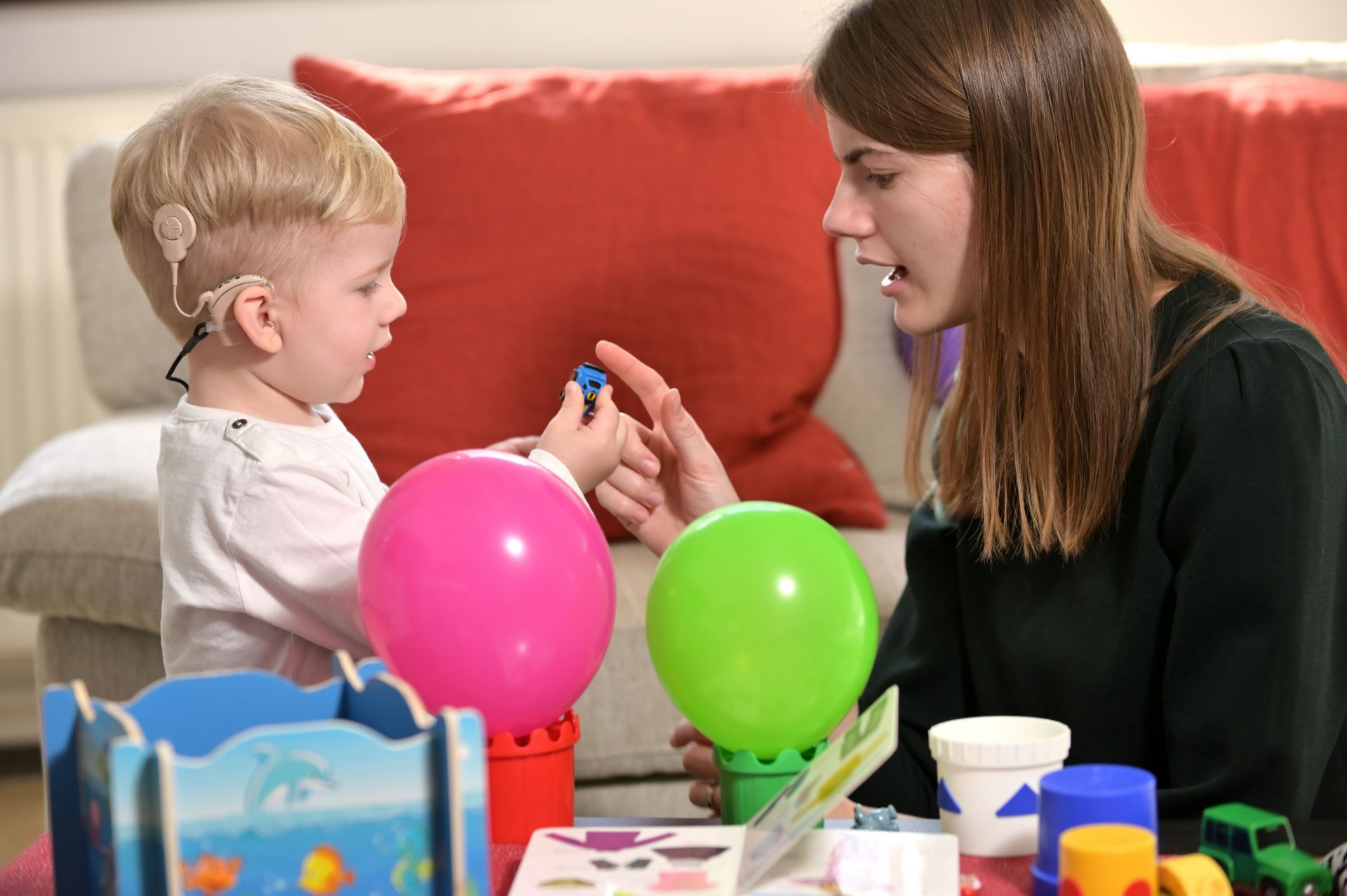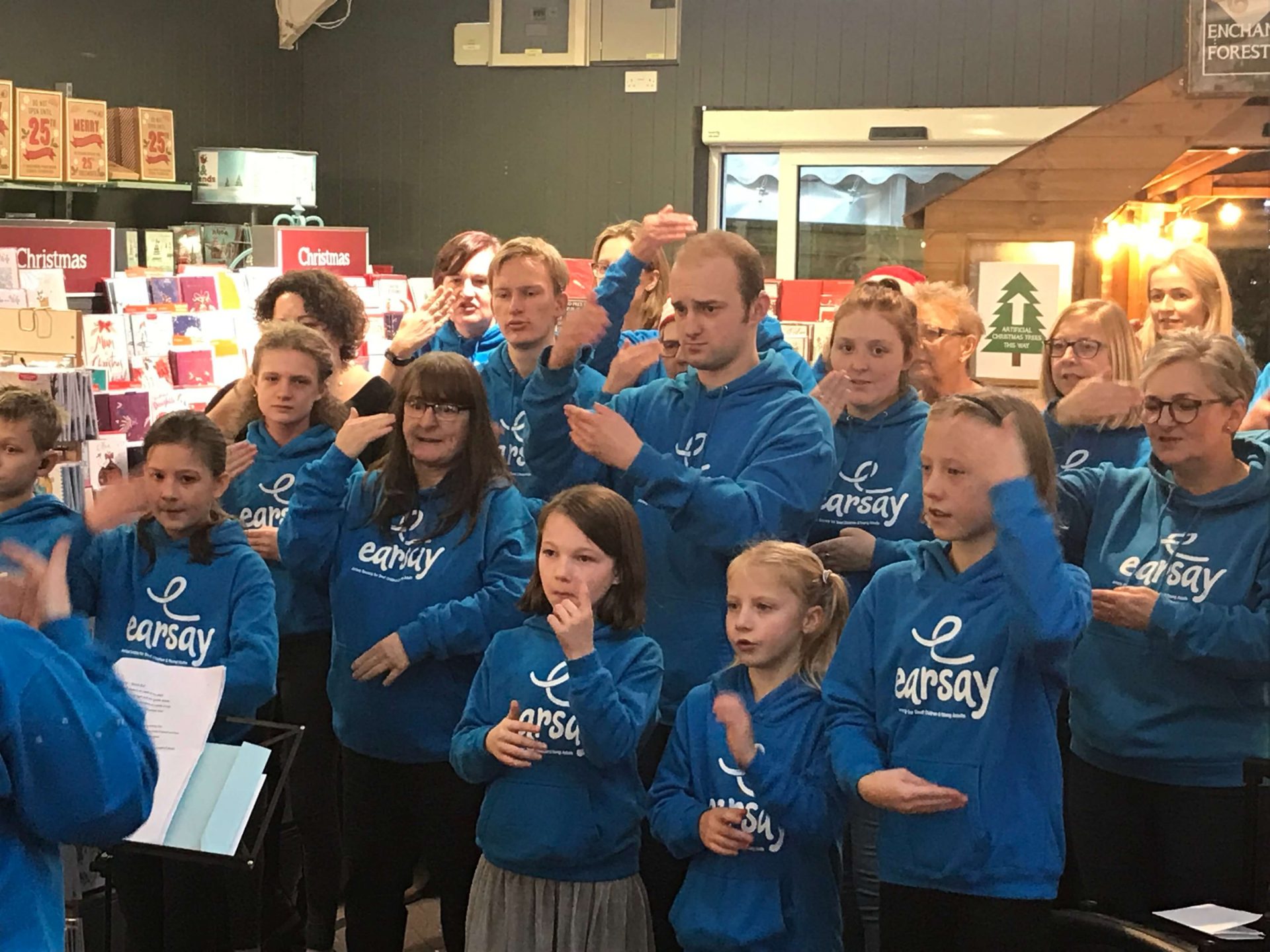Pre School

It’s important to remember that with the right support and encouragement, your baby can develop the same fluent language and communication skills as other (hearing) children.

Earsay events are a great way for hearing impaired children to meet eachother and socialise.
At 0–3 months old:
- Talk and/or sign during everyday routines – nappy changing, bathtime, dressing.
- Sing to your baby! They love to listen to people singing, and it helps naturally emphasise the rhythm and tone of your voice which really helps language learning. All babies love to feel the music too, so put their hand against a guitar, or their head to your voicebox. It might even put them to sleep!
At 6 months old:
- Get some baby books for your baby to explore. They may throw them or put them in their mouth but familiarising your baby with books can help them develop an interest in them.
- Pushing your baby on a swing is a great way to practise saying “hello” and “goodbye”.
- Copy your baby’s babble patterns and mould them into real words – “dada. Yes, Daddy’s coming!”
At 9 months old:
- Carry on singing songs and nursery rhymes, using signs or actions to go with them – leave gaps when you sing to allow your baby to take a turn.
- Hide toys and objects under a cloth or blanket for your baby to find. Talk/sign with them to ask them where the toy is and praise them when they find it.
- Watch tv programmes for young children together and talk/sign about what’s happening.
At 12 months:
- Start to encourage pretending by playing with soft toys, dolls, cars, tea sets, toy vacuum cleaners – anything your baby enjoys.
- Look at picture books together and let your babys favourite cuddly toy join in too – soon your baby will be reading them a story!
At 18 months:
- Practise talking on the phone or using Facetime/Skype.
- Make a special photo book, (or use a smartphone or tablet) with pictures of their favourite people, toys and activities.
At 2 years:
- Play searching games – ask your child to point at/find objects – at the supermarket or when playing outside.
- Watch children’s tv together, and then talk/sign about it afterwards.
Technology, such as hearing aids and implants, allows most deaf and hearing impaired children to hear sound, sometimes close to typical hearing levels, however, it cannot replace normal hearing.
Even with aids or implants, there will be times when your child has difficulty hearing compared with hearing children. But other technology and adaptations are available to make listening as easy as possible for them. Your audiologist or Teacher of the Deaf can advise you.
If you’re concerned about your child’s speech and language development, they might need some speech and language therapy
Speech and language therapists work as part of a team with your child’s audiologist and Teacher of the Deaf to help your child and those around them to communicate as well as possible (in sign language or speech). Talk to your Teacher of the Deaf, GP, health visitor or nursery staff to ask for a referral to a speech and language therapist.
As a parent, you play the most important role in helping your child to learn and succeed. There are many simple things you can do to develop your child’s reading, writing and maths skills before they start school.
Some top tips for learning at home, which really apply to any child, are:
- Give your child lots of opportunities for conversation so they can develop their language and learn new words and phrases, including talking about things related to maths and numbers.
- Read with your child and encourage them to read a range of different things.
- Make learning as much fun as possible, especially with games and everyday play.
- Provide opportunities to be creative in play to help develop their maths thinking and understanding.
- Encourage them to write.
- Recognise what your child does well and praise them.
Develop your child's maths skills:
- Introduce maths language naturally during their play and activities (bathtime, shopping). For example, “how many?”, more, tall, less, big, full, light, etc. Many hearing children pick up maths language through incidental learning, so you may need to support your deaf child more directly with this.
- Rhymes, songs and stories are a fun and great way to introduce your child to maths language, including counting and learning number patterns.
- A child’s working memory affects how easy or difficult they find maths (this is the ability to keep a limited amount of information in our heads for a short amount of time). You can develop your child’s working memory with games such as matching pairs cards.
- Help your child to learn numbers by talking about them and pointing them out from an early age, for example, on doors, telephones/mobiles, and clocks etc.
- Introduce counting in everyday life, like climbing stairs or items in a shopping basket.
- Play together with shapes – sorting them and talking about them, for example, which shapes are similar, curved, etc.
- Do some problem-solving together – share five cakes between two plates or fill four cups equally from a jug of water.
- Play shops – make price labels together and use real coins to ‘buy’ items, or do some measuring – toys, furniture, feet!
Develop your child's reading skills:
- Let you child choose what books they want to read – they’ll enjoy reading more if they feel involved.
- Encourage them to read lots of different types of texts – picture story books, books of rhymes, non-fiction books, children’s magazines, postcards and even menus!
- Explain any words they don’t know, perhaps using pictures, objects or sign language.
- Talk about what’s happening in the book as you read it together by asking open questions, for example, “What do you think will happen next?”
- Use reading to open up discussions about feelings “The monkey is sad. Do you ever feel sad? What makes you feel sad?”
- Use your facial expressions, gesture, sign, actions and vary the tone of your voice to help tell the story.
- Encourage your child to act out the story with their toys and encourage them to start reading independently by suggesting they ‘read to teddy’.
Develop your child's writing skills:
- Through drawing and art, young children can develop skills to help them start writing. Early writing starts with ‘pretend’ writing at around 3 or 4 years. To help your child develop their control of pencils/crayons and their hand-eye co-ordination, try:
- painting with finger paints
- dot-to-dot pictures
- tracing pictures
- copying patterns and pictures
- drawing in sand and on blackboards
- To help your child start learning to write their name (or the first letter of their name for very young children) write it in big letters on a piece of paper and let them trace over it